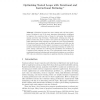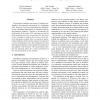272 search results - page 35 / 55 » Code Transformations to Improve Memory Parallelism |
134
click to vote
EUC
2005
Springer
15 years 7 months ago
2005
Springer
Abstract. Embedded systems have strict timing and code size requirements. Retiming is one of the most important optimization techniques to improve the execution time of loops by in...
112
click to vote
IPPS
2005
IEEE
15 years 8 months ago
2005
IEEE
The Distributed Shared Memory (DSM) model is designed to leverage the ease of programming of the shared memory paradigm, while enabling the highperformance by expressing locality ...
138
click to vote
ISPASS
2008
IEEE
15 years 8 months ago
2008
IEEE
—The potential for improving the performance of data-intensive scientific programs by enhancing data reuse in cache is substantial because CPUs are significantly faster than me...
111
click to vote
IPPS
2009
IEEE
15 years 9 months ago
2009
IEEE
Experimental validation and testing of solutions designed for heterogeneous environment is a challenging issue. Wrekavoc is a tool for performing such validation. It runs unmodi�...
97
Voted
HPCA
2008
IEEE
16 years 2 months ago
2008
IEEE
As multicore systems become the dominant mainstream computing technology, one of the most difficult challenges the industry faces is the software. Applications with large amounts ...


